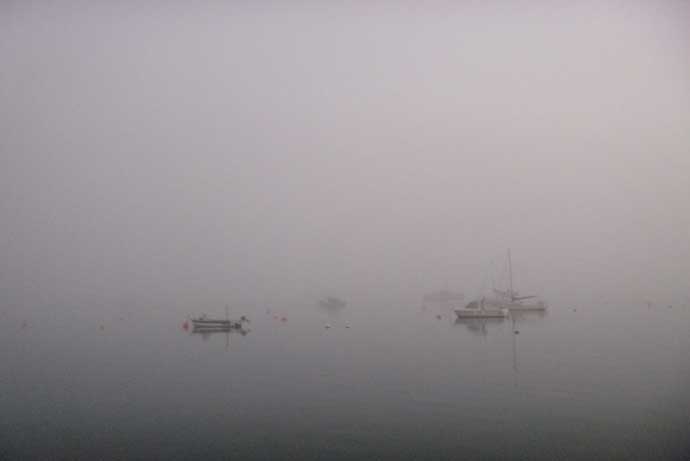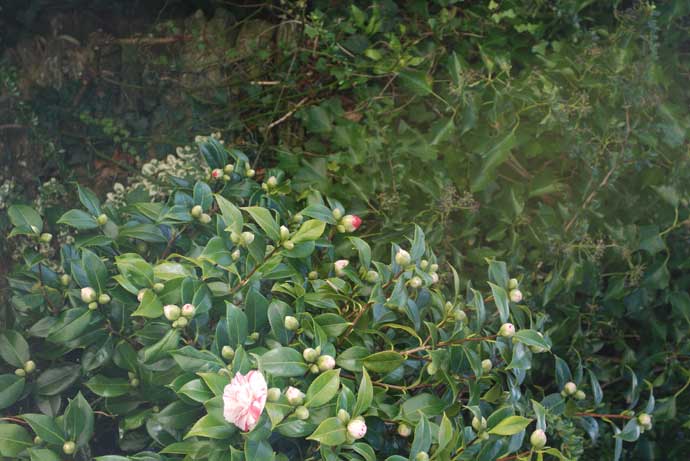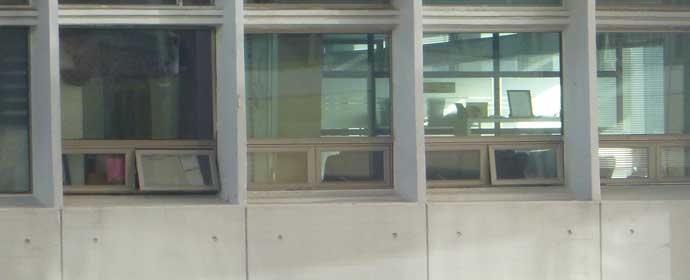Anyway. I realise that it’s customary on social media to post a photograph of One’s lunch, the O being ironic because One thinks One is an archaic usage for “I”, but my usual sandwich comes in a brown paper bag, and today’s - well, let me tell you about today’s. Triangular box, more card than cardboard, you know the kind of thing, with a perforation so that you can open the long side and get at the sandwich. I would continue, but it’s the kind of box that sandwiches come in, if you buy them in department stores. You know this box. It’s that box. No! Too late for a photograph. Sorry, sorry. It was good, thank you. No, I’m fine. Love one, but could you make it a decaf?
Where was I? Oh yes. Or buy them at train stations, I was about to say. Or in any setting where the actual business of making the sandwich is remote from the act of buying it. I can sit here and imagine the making of my usual sandwich, because most days, I watch the woman who makes it. I walk in, we exchange the look that passes between a woman who makes sandwiches and a man who eats them (to be clear, this look being the one that passes between them if they don’t know each other beyond this single transaction, and not the look [some text missing here] all passion spent - sorry, I really am going to cut down on the coffee), and she makes me a sandwich.
But today’s sandwich, the one bought from the department store. I suppose it was made by a human being, or at least by a long series of industrial robots with a human being watching over them. One dollops the filling onto the bread, another cuts, here comes the box (carton?) on another conveyor belt, somebody presses the red button and with a rush of compressed air sandwich and box are one. For One to open up and eat. So to speak. On the side of my sandwich box is the phrase “Discover delicious everyday…”, so I suppose I did that earlier, discovered delicious by eating the sandwich, although for “everyday,” I prefer my unambitious brown paper bag.
And its hand-made contents. I’m assuming the phrase is an invitation to discover “delicious” on a regular basis, and not a description of today’s opportunity to discover the “delicious everyday” just once. But your guess is as good as mine. My old Asus tablet used to start the day by displaying the phrase “In search of incredible”. Until I sat on it. Then it discovered recycling. Like the poet ee cummings, incredible preferred lower-case letters. I used to think of him as an unusually mild-mannered old gentleman sitting in the leather armchair next to the fire at the beginning of a story by M R James or, say, H Rider Haggard: oh, professor incredible had a story to tell, if you could get him to tell it.
The fire crackling in the background and the narrator pulling up a footstool, of course. Although if we’re going in search of him, rather than finding him at the outset, maybe I should put him at the heart of darkness and let Joseph Conrad tell the story. His son went into the movies, you know. Delicious, meanwhile, hung out at the Moulin Rouge and was close to the painter Toulouse-Lautrec, with whom she shared - wait a minute! This is a post about a sandwich. And the box it rode in on - came in, I mean. Delicious was only discovered at lunchtime. She won’t be a star just yet, although I suppose it’s just about possible she’s already caught the attention of a young painter - sorry. Returning you now to our scheduled blog post.
On the other side of this box - I just know I should be calling it a carton - is a further message: the principal ingredient of the sandwich was “marinated in a rich, slow-cooked stock then roasted for fantastic flavour and succulence.” It was a perfectly good sandwich, actually, but I won’t tell you what was in it because the more I think of it, the more guilty I’m feeling. Not because I’m unaffected by the mental image of all those cooks marinating my sandwich for fantastic flavour - huh? It was a store-bought sandwich - nor because I must have failed to spot the “I discovered delicious” t-shirt that must have been on sale next to the sandwich, but because…
I don’t know. We’re between Thanksgiving and Christmas. Season of depressing online cartoons about turkeys feeling apprehensive. Sigh. Although the hyped-up verbiage, in this case about a straightforward sandwich, is a year-round thing. I was in a coffee shop the other day, reading the stuff written on the wall about what the baristas do - and then watching the group of fresh-faced, young-looking people behind the counter chatting and laughing and making the occasional coffee - and I thought: no. Marshall McLuhan may have been perceptive, but he was also wrong. The medium is only superficially the message. But how much of the world has floated off into this described medium-reality of marinated sandwiches and lovingly constructed half-fat arabica cappuccinos and - I wonder if the Emulsifier E471 in my sandwich was organic, by the way - and how much of it is still grounded in real reality?
The medium isn’t the message unless you tune into it. The medium is the message if you have a Facebook account, perhaps. Buy a sandwich in one store, and a team of imaginary cooks gather in an imaginary kitchen to marinate and slow-roast and get in each other’s way generally. Walk into my regular sandwich shop and if you have the nerve to ask the woman to describe the origins of the sandwich she’s just handed you, she’ll look at you in a different way and tell you she cut the roll in half and put the [some text missing here] in the middle. Make your own, let’s say, cheese sandwich, and do you … wow, follow the steps in the recipe I’ve just found online for Cheddar Cheese? Your team of baristas - sorry cooks - will have to roll up their sleeves, secure their little hats on their heads, and - taking step 19 as an example - “remove the cheese from the press and air-dry for two to three days”.
I wonder if they’re allowed to blow on it. I’m impressed by how far you plan your lunches in advance. Oh no, wait a minute, sorry, this is imaginary reality.
Let us go then, you and I, to some place beneath the sky where we can hand-pick only the finest coffee beans - oh, okay, you can grab them between your toes - and milk a passing cow that’s only ever fed on the finest pasture, then leave our coffee beans to slow-roast over an open fire of apple-wood logs while we collect the dew from the mountain to fill our copper kettle, and then if the milk’s still fresh - important to do these things in the right order, isn't it? - we can make ourselves hand-painted bone-china mugs of coffee and scroll down together to below the picture, where we’ll find a post about Brexit. Oh, joy.

One of those two messages uses the word “could” seven times in six bullet points, by my count, and the other bets, if not the farm, then at least several acres of prime grazing land on a surprising (to me) combination of personality politics and monologues delivered straight to camera by people in suits. Scroll down both - did I mention I’m on Facebook here? - and you get a distinct impression that one’s spent more than the other on buying a social-media strategy. Or paid more attention to the techies, at least.
Just as the Polish cavalry charged the German tanks at the beginning of World War Two, so the next UK election is going to be fought on the playing fields of the internet. Was that the lesson of Obama? Or Corbyn? I forget. But the most recent lesson of history that’s been learned in politics is that social media wins. You connect with young people, et cetera, and they get active. I’d just like to add, for any politicians reading this, that bullet-point lists have been around since magazine covers were printed exclusively on paper. Also, even Generation Whatever’s grandparents could tell you that a short bullet-point list always beats a long one. Maybe we could learn that again some time.
Those who learn the lessons of marketing probably assume that the winning strategies from last time will win again next time. I wonder. If only we could scroll forward to 2022 and read all the political commentators telling us what was obvious to them even as far back as 2018. For my part, I’d just like to clarify one thing. I’ve just re-read the paragraph before this one, and I’d like it understood that “the most recent lesson of history that’s been learned in politics” isn’t necessarily the same as “the most recent lesson of history,” full stop. The most recent lesson, strictly, is the unwelcome one - unwelcome in some of the more vocal circles of our good old liberal democracy, anyway.
We have “it” because a lot of people voted for “it”. We have - oh, never mind. US readers will know what I mean. The vote went that way, so we got him, and the mid-term re-vote wasn’t quite an unambiguous correction of a mistake by an electorate accepting that it got it wrong first time. But we’ve re-classified all that as populism, haven’t we? On both side of the pond? Which means it doesn’t count, right? The lesson of history is still the one before that, correct? Win the online battle for hearts and minds, and you’ve won the election. If participation in online hot-air extrusion is a sufficiently mass activity to ensure - no, forget I said that.
In other news recently, I learned from an inside-page story in a newspaper (younger readers: primitive news medium, printed on paper; newspapers can appear online, but here, the writer seems to be emphasising that this news item wasn’t highlighted in his online news feed) that Hungary, an EU member state, has passed a law criminalising homelessness. I don’t know what I think about the likely impact of the “Draft Agreement on the withdrawal [blah blah blah],” and yes, we have no capital w, on jobs and the economy, but I have scrolled through the 585 pages, and I’m pretty sure the Joint Committee’s going to give us some fun. The rest of it’s a fine example of a contract so very detailed and precise that it can only - I nearly wrote “can only cause argument”, but of course what I really mean is: can only be debated in summary.
Imagine politicians hurling scriptural one-liners back at each other, and you get an idea of what would happen if they decided actually to argue about this thing for real. Clause this, paragraph that, subsection the other says, “Thou shalt not…” Ah, but Clause that, paragraph this, subsection something else specifies that any such prohibition will only apply on Thursdays, when there’s a full moon and an r in the month…” Reading (skimming) this ultra-detailed draft, I begin to see why politics sticks to sound-bites. We can go with either of the messages at the top, according to our baseline emotional allegiance. Or we can ignore it all, because we’re “populists” and, I don’t know, we go with our gut.
But we couldn’t possibly get anything useful from reading this thing, surely? I mean, I’m reassured by this, which you’ll find on page 361. “Taking into account the importance of international cooperation and agreements on labour affairs and of high levels of labour and social protection coupled with their effective protection, the Union and the United Kingdom shall protect and promote social dialogue on labour matters among workers and employers, and their respective organisations, and governments.” Earlier, the negotiators have defined their terms: we know by this stage what “Union” and “United Kingdom” mean. They haven’t defined “protect,” nor “promote,” nor indeed “social dialogue”. But at least both sides can agree on what “United Kingdom” means. No grounds for argument there, eh?
My only problem with the word “populist” is that I can’t quite get alongside any definition that assumes populists listen to any politicians for long enough to be fooled by them. But never mind. My only problem with the Draft Agreement is that there are people in the world who believe that pulling together such a farrago of scrupulously assembled and cross-referenced minutiae could have any bearing on the way real people live. In the real world. Are there windows in the rooms where Brexit negotiators meet? I know they spend their nights as well as their days negotiating together, especially when they're close to deadlines. They negotiate without sleep. But they must get out some time - but never mind.
As I say, I don’t know what I think about the likely impact of the Draft Agreement on anything that really matters, here in real life. But thanks to the weather app on my iPhone, I do know that the temperature is expected to drop below freezing tonight, in Budapest.
Everything else I could have said here about Brexit, I said about some previous festival of tedium in my book Who’s Afraid of the Media-Political Complex? (2014). That’s out of print now, but you can work out most of it from the title. The cover’s over there on the right.
Not comfortable thinking this, and certainly not advocating anything, but if you go back to the simple question asked in the 2016 referendum - leave or stay? - you might begin to wonder whether a no-deal Brexit wouldn’t be the closest match to “the will of the British people”. It would make fools of a lot of people, and do a lot for Theresa May’s long-term reputation, if the eventual release of this year’s cabinet papers revealed that the whole charade has been a devious plot to get out without a deal.
What if she told her people, privately, that she would resign if she didn't get the vote she wanted?



